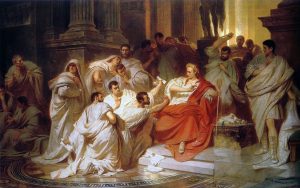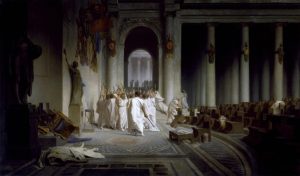Julius Caesar was believed to be assassinated by around 40 to 60 senators during the Ides of March (Mar 15) in 44 BC. This event took place at the Temple of Pompey during one of his meetings with the Senate. The key members that plotted to kill Caesar were Marcus Junius Brutus and Gaius Cassius Longinus.
Background
Julius Caesar was one of the rulers under the political alliance called the First Triumvirate who reigned over the Roman Republic from 60 to 53 BC. The death of one of the triumvirs, Crassus, led to a civil war between its remaining members, Julius Caesar and Pompey. Julius Caesar was able to triumph over Pompey in the Battle of Pharsalus, which caused the latter to flee to Egypt where he would be killed, leaving Caesar as the dictator of the Roman Republic.
Caesar’s rule started in 49 BC. He was declared “dictator in perpetuity,” able to hold power until death right before he was killed. The concentration of power in Rome on one person gave rise to increasing tension around the political structure of the city because its democratic institutions were threatened.
The plot to assassinate Caesar was planned by a number of senators that referred to themselves as “Liberators”. They claimed to have acted in order to avoid Caesar’s tyranny; however, the results were not as they had hoped.
The Day of the Caesar’s Assassination
On the 15th of March 44 BC, Julius Caesar was scheduled to meet the Senate. His wife Calpurnia tried to persuade him not to go to the meeting because of a prophecy by the seer Spurinna. Spurinna had warned him that he would not live past the Ides of March. Calpurnia had a dream in which Caesar was dead, which was possibly brought about by her fears of the prophecy. The Roman general and former politician Decimus convinced Caesar to continue with his journey. He escorted Caesar to the senate-house and, along the way, avoided Mark Antony, one of Caesar’s loyal supporters who could have prevented Caesar’s death.
Plutarch documented the senate meeting, which started with senator Lucius Tullius Cimber’s plea to have his exiled brother permitted to come back to Rome. Caesar dismissed this, and Cimber grabbed Caesar. At this point, Publius Servilius Casca revealed his dagger and stabbed Caesar. Caesar attempted to escape but lacked visibility due to the blood that stained his eyes, then he fell and was knifed to death by other conspirators. He was stabbed a total of 23 times.
After Caesar’s Death
Unlike the support Brutus had expected from the people upon the death of Caesar, the Romans were angry at the conspirators. The lower and middle-class Romans had a negative reaction to the assassination because it was done by aristocrats and they themselves held Caesar in high regard. They burned down the Temple of Pompey in their outrage. Others stayed indoors in fear of being murdered as well.
Mark Antony gathered the Senate and negotiated that all of Caesar’s reforms would be kept, but the assassins would not be penalized. Octavian, Caesar’s grand-nephew, was written and declared Caesar’s heir through the former dictator’s will. The Romans were still indignant about the assassins, wanting them to be punished.
The Second Triumvirate was formed from the law Lex Titia which allowed them to share consulship and rule over the republic. It consisted of Mark Antony, one of Caesar’s trusted generals and supporters; Octavian, Caesar’s grand-nephew; and Lepidus, another one of Caesar’s advocates. They planned to avenge Caesar’s death during their reign over Rome.
Marcus Junius Brutus and Gaius Cassius Longinus escaped Italy and gathered forces in the east. During the Battle of Philippi, they were defeated by the Second Triumvirate. Cassius committed suicide, followed by Brutus.

